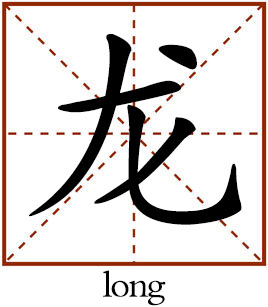Dragons

Long (dragons) in Chinese culture are the embodiment of many virtues, including perseverance, strength, justice, inclusiveness, enterprise and independence. Proudly claiming to be the descendants of a dragon, Chinese people willingly shoulder the responsibility of inheriting and carrying forward all these fine virtues.
画龙点睛
hua long dian jing
Hua means “to paint” while long refers to dragons. Dianjing means “to dot the pupils.” This proverb, taken literally, means finishing the painting of a dragon by taking the last step of drawing its pupils.
According to the legend, Zhang Sengyou, a well-known painter in the Southern and Northern Dynasties (420-589), once painted four dragons without dotting their pupils, saying that if he did, the dragons will fly away. People did not believe him and dotted the pupils of two of the four dragons. Those two dragons flew away just as he said.
This idiom is used to describe the decisive move that help bringing the painting to life. It is also used to describe the technique, in writing or speech, to manifest main ideas with succinct words at a key point.
卧龙凤雏
wo long feng chu
Wo means “to crouch, to rest” while chu means “fledgling.” Long means “dragons” while feng means “phoenixes.” The idiom, taken literally, means a crouching and resting dragon, and a fledgling phoenix.
This idiom originated from the stories of Zhuge Liang and Pang Tong, two brilliant advisors of Liu Bei (161-223), first King of Shuhan Dynasty in the Three Kingdoms Period. Before meeting Liu Bei, both Zhuge and Pang were known only by their close friends for their gifts in governing a nation. Zhuge chose to live in solitude in the mountains in Xiangyang. He called himself a “crouching dragon.” Pang Tong was also called a “fledgling phoenix.” Liu Bei asked them to be his advisors and they helped Liu make great achievements.
The idiom is used to compliment a person who has outstanding gift, even though he lives in solitude or is still very young. It implies that when time comes, they will make great achievements.
龙生九种,九种各别
long sheng jiuzhong, jiuzhong ge bie
Sheng means “giving birth to.” Jiuzhong means “nine kinds.” Ge means “each one” while bie means “being
different.”
This proverb, taken literally, means that the dragon gives birth to nine, and each is different from the others.
This proverb is commonly used to say that one family may bear children with different characteristics.
龙多不治水
long duo bu zhishui
Duo means “too many” while zhishui means “to control the flood.” This proverb, taken literally, means that many
Dragons in Chinese culture control floods. However, when there are too many of them, every one has his own ideas of how the flood should be controlled. This leads to endless conflicts since they are all professionals. This
